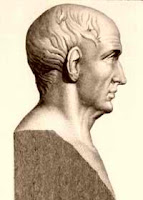Pagan Influence in the Writings of Paul
Kicks Against the Pricks
Euripides : "kicks against the pricks" (Euripides, Bacchae.)
Aeschylus:. "kicks against the pricks." (Aeschylus, Agamemnon 1624.)
Acts 26:13 "kicks against the pricks" (Luke quoting Paul's vision account)
Note on Euripides: The context is that Dionysus discards his divine nature and walks in the human world disguised…Dionysus, the god disguised in human form, tells him that his efforts to resist the new movement will be completely worthless; he is not contending against flesh and blood, but against a god. “You are mortal, he is a god. If I were you, I would control my rage and sacrifice to him, rather than kick against the pricks” [From Euripides, The Bacchae]. Source:
A. N. Wilson, Paul:The Mind of the Apostle (W. W. Norton & Co., N.Y., 1997), pp. 75-76.
'We are indeed His Offspring' and "in thee we live and move and have our being"
Aratus : "for we are indeed his offspring." (Aratus, Phenomenae / Phainomena 1-5)
Epimenides (6th Century BC): "for in thee we live and move and have our being." (About Zeus)
Acts 17:28 - Paul teaches: "For in him we live, and move, and have our being as certain also of your own poets have said, For we are also his offspring."
'Cretans Are Always Liars'
Epimenides "the Cretans, always liars, evil beasts, idle bellies...." (Epimenides, Cretica -- a poem scolding the Cretans for making a tomb to Zeus because Epimenides believed Zeus to be eternal.)
Titus 1:12 "One of themselves, [even] a prophet of their own said, The Cretans [are] always liars, evil beasts, slow bellies...."
First learn Piety at Home
Publius Terentius Afer (Terence) (Latin comedy writer) 190 BC: "But if any widow have children or nephews, let them learn first to show piety at home." (Andria Act IV -- at this link pp 34-44.)
1 Tim 5:4 "But if any widow have children or nephews let them learn first to show piety at home"
 Terence Terence
Better to Give Than Receive?
In Acts 20:35, Paul attributes to Jesus the statement it is "better to give than receive." Even though Acts is Part II of the Gospel of Luke, and Luke claims to be relying upon witnesses to collect sayings of Jesus for his Gospel, Luke does not trust Paul's claim enough to include it. Luke explained to Theophilus -- to whom Acts too is addressed:
1 Inasmuch as many have undertaken to compile an account of the things 1aaccomplished among us,
2 just as they were handed down to us by those who afrom the beginning 1werebeyewitnesses and 2cservants of dthe 3word,
3 it seemed fitting for me as well, ahaving 1investigated everything carefully from the beginning, to write it out for you bin consecutive order, cmost excellent dTheophilus;...(Luke 1:1-3 NASB)
Perhaps Luke omitted Paul's statement from Luke's Gospel because Luke recognized it as a paraphrase from a famous Greek history. For Thucydides in History of the Peloponnesian War (Thomas Hobbs, Ed.)(London: 1843), at II.97 writes:
[3] The tribute they received from all the barbarian nations and from the cities of Greece, in the reign of Seuthes (who reigned after Sitalces and made the most of it), was in gold and silver, by estimation, four hundred talents by year.And presents of gold and silver came to as much more, besides vestures, both wrought and plain, and other furniture presented not only to him but also to all the men of authority and Odrysian nobility about him. [4] For they had a custom, which also was general to all Thrace contrary to that of the kingdom of Persia, to receive rather than to give;and it was there a greater shame to be asked and deny than to ask and go without.Nevertheless they held this custom long by reason of their power, for without gifts there was nothing to be gotten done amongst them.So that this kingdom arrived thereby to great power. [5] For of all the nations of Europe that lie between the Ionian Gulf and the Euxine Sea, it was, for revenue of money and other wealth, the mightiest;though indeed for strength of an army and multitudes of soldiers, the same be far short of the Scythians. [6] For there is no nation, not to say of Europe but neither of Asia, that are comparable to this, or that as long as they agree, are able, one nation to one, to stand against the Scythians.And yet in matter of counsel and wisdom in the present occasions of life, they are not like to other men.
|



 Books
Books Terence
Terence